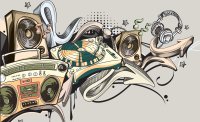The Power of Rap and Hip-Hop in the Classroom
Educators are finding creative, culturally responsive ways to use rap and hip-hop music to teach history, poetry and writing.
Your content has been saved!
Go to My Saved Content.In School Library Journal’s “Hip-Hop EDU: Use Music To Spark Students’ Creativity and Learning,” journalist Marva Hinton delves into the creative ways educators are using hip-hop to improve learning and engagement.
Hip-hop music is “the language of global youth culture,” says author and educator Carole Boston Weatherford, and has increased in popularity over the last few decades, with a recent spike prompted by the popularity of the musical Hamilton. “In the past, that often meant a well-meaning teacher putting on a gold chain and imitating something you might have seen on Yo! MTV Raps in the late ’80s” Hinton writes. “But today, many educators are being more thoughtful about how best to incorporate hip-hop into their lessons.”
Hinton describes how Andy Spinks, a library media specialist at Campbell High School in Smyrna, Georgia, created a popular recording studio in the library for students to create music, learn about digital recording, and—most importantly—collaborate.“The reason they’re drawn to it is because they have things they want to say, they have a way that they want to say them, and they’re given a lot of license to do that there,” Spinks says.
As educators begin to see hip-hop as poetry, it can open doors for writing instruction: Rap songwriting can spark engagement in students who may be less interested in traditional writing. Spinks’ student sophomore Jarrett Modica, for example, found his voice by writing and producing lyrics in the recording studio. “It’s a place where you can just be yourself,” Modica said.
Some educators hesitate to use hip-hop music because of the profanity, violence, or explicit language featured in some of the songs. Set boundaries and expectations for lyrics, Spinks advises. He tells students to avoid any lyrics that promote bullying and forbids lyrics that are negative about another member of the school community. “You can do a dis track about Drake if you want to, but don’t do one about somebody in this school,” Spinks said. Give parents advance notice of controversial material, and explain how and why the content will be used.
At West Boca Raton High School, librarian Kristine Cannon has developed a reading curriculum around the book Let Me Hear a Rhyme; the class is reserved for students who failed the state’s standardized English tests. “We just thought that the element of the music, the hip-hop, and even the time period would really grab the students,” Cannon told Hinton. “We thought that it would give us a lot to discuss with them.”
Because it is a topic students are interested in, it can be used as the subject matter for less interesting lessons, too, Hinton writes. Libby Gorman, library media specialist at Edgewood Middle School in Maryland, uses hip-hop examples to teach citation, a subject she concedes is mostly “boring.” Using examples such as Will Smith’s “Friend Like Me” and Lil Nas X’s “Old Town Road,” Gorman engages students. She incentivizes proper citation: “The rule was they had to cite it before they could play it, but once they cited it, they could play the music,” Gorman said.
But hip-hop can be deeply integrated into the curriculum as well. Librarian Joquetta Johnson uses hip-hop as the culturally responsive foundation for cross-curricular studies that involve creative writing, reading, and even math. In one lesson, “students had to solve a scenario-based math problem about Kendrick Lamar.” They identified patterns in his Twitter feed and determined the growth of his fan base. Johnson also uses hip-hop to teach students about digital citizenship, copyright and intellectual property.
